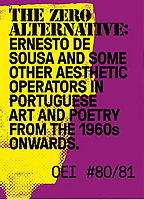
OEI #80–81
The most recent issue of Stockholm based OEI magazine takes its starting point in Ernesto de Sousa’s explosive activities as filmmaker, photographer, curator, critic, writer, folk art researcher, multimedia artist etc. in the Portuguese 1960s onwards. Being active in almost everything that belongs to the domain of the arts in the broadest sense of the word, Ernesto de Sousa (1921-1988) adopted the term “aesthetic operator” to be used instead of the word “artist” – “for the simple reason that ‘artist’ designates a kind of sociological position and not a philosophical attitude towards the world” (José Miranda Justo).
As a “source of enthusiasm, dynamism and motivation” (Isabel Alves), Ernesto de Sousa created new connections between all sorts of disciplines, forms, materials and social contexts. In its 640 page long textual and visual montage, including a series of new essays and translations of key essays, as well as a lot of archival material, OEI #80-81 also looks at the practices of a number of De Sousa’s fellow “aesthetic operators” (Alberto Carneiro, Túlia Saldanha, Álvaro Lapa, Fernando Calhau, Lourdes Castro, Ana Vieira, Ana Hatherly, E.M. de Melo e Castro, António Barros…). At the same time, OEI #80-81 encompasses texts on magazines such as Poesia Experimental, Operação, Nova, A Urtiga, and Alternativa; and works by artists from younger generations such as Isabel Carvalho, Paulo Mendes and Mariana Silva.
This special issue of OEI magazine also accompanied the exhibition
Supergood – Dialogues with Ernesto de Sousa at MAAT (2018), curated by Hugo Canoilas.
*
Ernesto de Sousa (Lisbon, 1921–1988) was one of the most complex and active figures of his time, a prolific multidisciplinary artist and an avid producer of synergies between generations of artists from both the first and the second half of the 20th century. Defending an experimental and free artistic expression, he dedicated himself to the study, promotion and practice of the arts, as well as to curatorship, critique and essay writing, photography, cinema and theater. During the 1960s he connected to the Fluxus movement and with the European neo-avant-garde, and became friends with Robert Filliou and Wolf Vostell. This contact was significant to his vision of art as an experimental and participatory “open work”, of which the theatrical exercise Nós Não Estamos Algures (1969), the expanded film Almada, Um Nome de Guerra (1969-1972) and the mixed media Luíz Vaz 73 (with music by composer Jorge Peixinho) are some examples. During this decade and up until the 1980s, he organized courses, conferences and exhibitions on experimental film, video art, performance and happening, while promoting connections between the international neo-avant-garde and the Portuguese context. The exhibition “Alternativa Zero” (Galeria Nacional de Arte Moderna, Lisbon, 1977) synthesized this project of creating a Portuguese avant-garde in aesthetic and ideological dialogue with its international counterparts.
Ernesto de Sousa published extensively in magazines and newspapers since the 1940s, and his critique was instrumental in encouraging experimental artistic practices in Portugal. His strong involvement in the film society movement, which he founded in Portugal, was a major contribution towards the emergence of the “New Cinema” evidenced by his only feature film, Dom Roberto (1962), which won two awards at the Cannes Festival in 1963. It’s also important to mention his studies on Portuguese folk art and its theorization in the context of contemporary art as well as his rereading of the work of the “voluntarily ingenuous” artist Almada Negreiros, whose work anticipated the ideas de Sousa defended. Ernesto de Sousa was the Portuguese commissioner for the Venice Biennale in 1980, 1982 and 1984.
Stöd OEI genom att teckna en prenumeration
www.oei.nu
OEI is a Stockholm based magazine for extra-disciplinary spaces and de-disciplinizing moments – experimental forms of thinking, montages between poetry, art, philosophy, film, and documents; critical investigations, editorial enunciations, aesthetic technologies, non-affirmative writing, speculative archaeologies, new ecologies, and counter historiographies.
OEI magazine was founded in 1999 and has published 81 issues. The publishing structure OEI editör was started in 2002 and has released some 100 books of investigative poetry, aesthetic documents, artist’s books, theoretical and poetological texts etc. OEI is an artistic and literary project run by Jonas (J) Magnusson & Cecilia Grönberg.
Publicerad: 2018-10-05
Köp OEI
Läs mer om OEI i katalogen
Fler artiklar knutna till OEI
Fler tidskrifter i kategori LITTERATUR
Fler tidskrifter i kategori KONST & DESIGN
